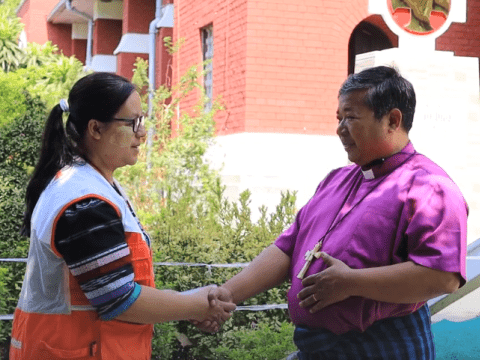Faith leaders rise amid earthquake devastation

Faith is deeply woven into the lives of Myanmar people with a strong reliance on their spiritual beliefs. In Myanmar, the predominant faith is Buddhism, alongside minority faiths like Hinduism, Islam, and Christianity, with many also practicing traditional beliefs. The March 28 earthquake has devastated numerous places of worship, including monasteries, pagodas, churches, temples and mosques across central Myanmar.
The impact was indescribable for David Nyi Nyi Naing, bishop of Mandalay diocese, The Church of the Province of Myanmar. Eight churches in Mandalay diocese suffered damage. “When the earthquake hit Mandalay and Sagaing, I was at home in the ministry compound. Though it lasted only moments, it’s like the end of the world. Our church’s roof and bell tower were damaged,” says bishop David.
YayTha Hpan Pariyatti Monastic Education Centre in Tada U was also severely affected. “Seventeen pagodas and nearly all religious structures in our monastery were damaged or destroyed by the earthquake,” says Dr Ariyavamsa, the Centre’s head.
The earthquake has profoundly impacted the lives of many people, causing both material and psychological devastation. Some has lost their homes and possessions, while others have suffered the tragic loss of both their homes and loved ones. “People avoid trees and tall buildings, feeling unsafe. Even those whose homes sustained minimal damage are still sleeping outside,” says bishop David, highlighting the earthquake’s psychological impact. Following the earthquake, in collaboration with donors and aid organisations, his church has provided urgent needs like rice, cooking supplies, and medicines as emergency relief to those affected.
“When the earthquake struck, many families came to us in tears, begging for help to rescue their loved ones trapped under the ruins and rubble of collapsed buildings,” Dr Ariyavamsa says. “These people are enduring immense pain and grief, so we did our best to comfort them. It is vital that we help everyone in need, regardless of their religion or race.” He has provided these families with care and shelter in his Centre’s compound. During this scorching season, the Centre is also providing essential aid like water and sanitation facilities for earthquake survivors and others from across the city.
World Vision is delivering essential relief aid to affected families and children, including rice, ready-to-eat food, drinking water, hygiene kits, and family supplies. “Three or four days after the earthquake, World Vision came to us and provided high-energy biscuits for the affected people.” Dr Ariyavamsa says. “They are also assisting us by inspecting the damaged buildings in our monastery to determine whether they can be repaired. We will be also working together to clear the buildings that cannot be restored or repaired.”
Bishop David emphasized the importance of partnership between faith-based organisations and international aid groups in the earthquake response. “Collaboration between faith-based organisations and aid groups can enhance the effectiveness of the support. Organisations like World Vision can address both physical and psychological needs, such as trauma recovery. Unified holistic plans from international aid groups can meet diverse needs effectively.”
Faith-based organisations play a vital role in earthquake response efforts. Faith leaders are doing their best to address the urgent needs of affected families and children. Their encouragement and support are crucial for those affected in this challenging time. Bishop David draws strength from scripture, citing Isaiah 53:3: “By His stripes we are healed.” He says, “Christ comforted others despite His own suffering. Serving God means healing others amidst our own pain, and we find courage in this truth. It’s a very challenging time for faith leaders. As I share in this hardship, I feel the pain and sorrow of the people. As faith-based organisations, we must rise above these challenges by helping those in need and drawing courage from God.”
Dr Ariyavamsa’s prayer offered solace, like cool water in a parched desert, to those affected and all Myanmar. “I pray for everyone to enjoy good health, freedom from troubles, longevity, and the fulfillment of their wishes.”
The 7.7 earthquake caused widespread damage to homes, schools, health centres and public infrastructure in Mandalay and Sagaing. The earthquake compounds an already dire humanitarian situation where nearly 20 million people already needed humanitarian assistance across the country due to prolonged conflict, recurring natural disasters and economic collapse.
So far earthquake has affected nearly 17 million people and almost 199,000 people have been internally displaced in Mandalay Region alone. Nearly 2 million new people are in need of humanitarian assistance since the earthquake.
World Vision is providing live-saving relief assistance to the children and their families affected by the earthquake. Through our humanitarian efforts, both immediate relief and long-term recovery, we aim to support 500,000 people, including 172,000 children. As of 21st April 2025, we have reached 162,133 people affected by the earthquake, including 52,358 children (30,019 girls, 22,339 boys).